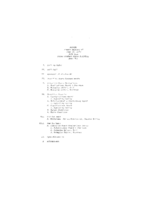Search the Special Collections and Archives Portal
Search Results
June Monroe and Kazuko Atomura oral history interviews
Identifier
Abstract
Oral history interviews with June Monroe and Kazuko Atomura conducted by Cecilia Winchell and Stefani Evans on July 14 and July 19, 2022 for Reflections: the Las Vegas Asian American and Pacific Islander Oral History Project. In the first interview, Kazuko Atomura describes her childhood in Taiwan and Tokyo, Japan, and shares both happy and difficult mememories of that time. Atomura eventually moved to Los Angeles, California, where she reconnected with a man she previously met in Japan. She married him and together had their daughter, June Monroe, and another son while living in Corpus Christi, Texas. After difficult medical procedures involving Atomura's husband and Monroe's younger brother, Brian, the family relocated to Las Vegas, Nevada. Monroe recalls attending Las Vegas High School and Bonanza High School, and the struggle of making new friends as a young person.
In the second interview, the mother and daughter discuss racism, discrimination, and identity. Kazuko Atomura recalls her many experiences with discrimination as a result of both her appearance and language barriers. June Monroe discusses how she came to be proud of her Japanese heritage, while Atomura discusses some of the community activities she has been involved in since living in Las Vegas including the Japanese Culture Club and odori dancing. Then, both Atomura and Monroe discuss Monroe's brother, Brian, who received two kidney transplants; one from Monroe's father and one from Monroe herself. Atomura talks about the shrines she has built for Brian, the experience of him being on dialysis, care taking, and his final days. Monroe shares about her activism with organ donation, being regularly involved with the Nevada Donor Network and helping to pass significant pieces of legislation within the area of organ donation.
Digital audio available; no transcript available.
Archival Collection
Charlotte Hill Papers
Identifier
Abstract
The Charlotte Hill Papers (1975-1996) document Charlotte Hill’s commitment to the Las Vegas, Nevada community and especially to the local PBS affiliate, KLVX Channel 10. The majority of the collection relates to KLVX Channel 10 and the work of the Friends of Channel 10 on behalf of the station, in particular information about fundraising events and volunteers. It also contains material related to Hill's membership in national organizations associated with public broadcasting. The collection includes some material about her work with the American Camping Association and the Las Vegas Sun Summer Camp Fund.
Archival Collection
Ralph Roske Papers
Identifier
Abstract
The Ralph Roske Papers (1957-1989) consist of Ralph Roske's book manuscripts, lecture notes, and correspondence. The collection includes extensive lecture notes on the United States Civil War, United States history, and Nevada history. It also includes Roske's research and manuscripts on Nevada, California, and the United States Civil War, as well as student
papers. Ralph Roske was a professor of history at the University of Nevada, Las Vegas (UNLV).
Archival Collection
Florence and Jerry Vallen Faculty Papers
Identifier
Abstract
The Florence and Jerry Vallen Faculty Papers (approximately 1935-2017) are comprised of personal papers and research files for Florence and Jerry Vallen, the founding dean of the College of Hotel Administration at the University of Nevada, Las Vegas (UNLV). The collection includes research files and drafts for
Archival Collection
The Story of Classic Las Vegas Oral History Interviews
Identifier
Abstract
Archival Collection
Vassili Sulich Papers
Identifier
Abstract
The Vassili Sulich Papers (1951-2005) document the life of Vassili Sulich: ballet dancer, choreographer, and co-founder of the Nevada Dance Theatre, the first professional dance company in Nevada. Included are correspondence, newspaper clippings, newsletters, photographs, posters, and scrapbooks.
Archival Collection

Meeting minutes for Consolidated Student Senate, University of Nevada, Las Vegas, June 19, 1979
Date
Archival Collection
Description
Text

Transcript of interview with William Carlson by Alice Brown, March 19, 1980
Date
Archival Collection
Description
Text

Lindsay Wenger oral history interview: transcript
Date
Archival Collection
Description
Oral history interview with Lindsay Wenger conducted by Barbara Tabach on March 13, 2018 for the Remembering 1 October Oral History Project. In this interview, Lindsay Wenger discusses her move to Las Vegas, Nevada in 2013 for her residency at the University Medical Center of Southern Nevada (UMC). She talks about her experience on the night of the October 1, 2017 mass shooting and recalls a few specific patients she treated throughout the night and into the morning. After discussing the events at the hospital, she explains how she has been emotionally affected and how her view of Las Vegas as a community has changed.
Text

Transcript of interview with Richard Erbe by Marcela Yepes, March 19, 1978
Date
Archival Collection
Description
On March 19, 1978, Marcela Yepes interviewed Richard Erbe (born 1922 in El Monte, California) about his experiences in Las Vegas, Nevada and specifically about his career in education. Erbe first talks about his family background and German ancestry before describing how he ended up moving to Nevada. He then describes his wife’s father’s background in the gaming industry and some of the early illicit casinos that existed in California. The interview shifts to Erbe’s educational background, his first teaching position as a fifth grade teacher, his experience in the military, and his reasoning for not seeking employment in the gaming industry. The two also discuss church activity, politics, and social activities in Las Vegas. The latter part of the interview includes Erbe’s viewpoints on the issues in the educational system, his experiences as a principal at multiple Clark County schools, and some of the challenges he encountered in the administrative side in the field of education.
Text
